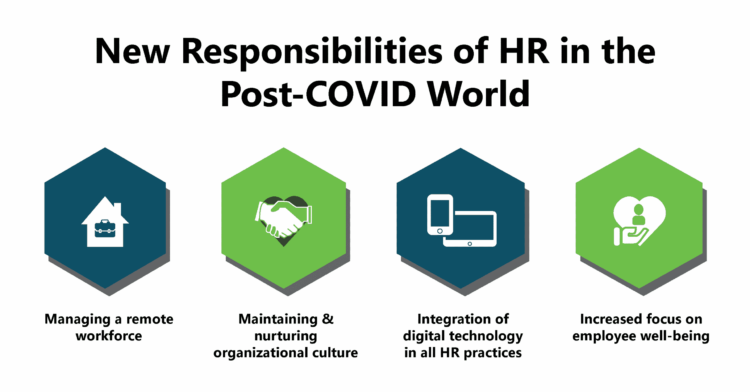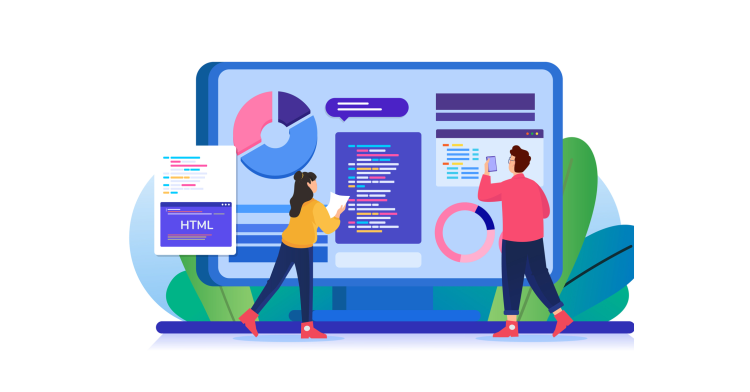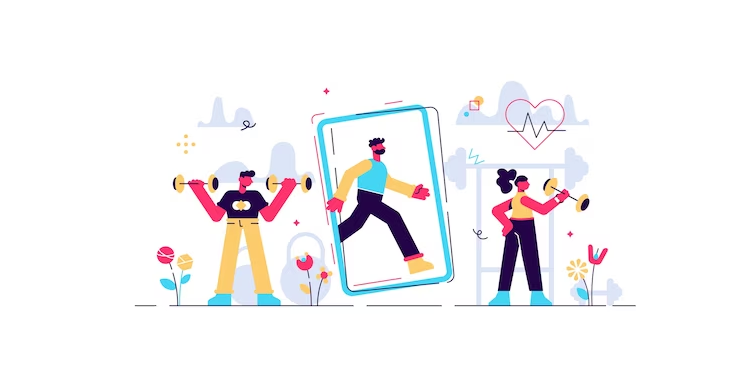1. Post-COVID-19, HR’s role will focus heavily on managing a remote workforce, requiring new policies for all stages of the employee life cycle.
2. HR must maintain and nurture a cohesive organizational culture despite a dispersed workforce, ensuring employee engagement and communication.
3. Integrating digital technology into HR practices will accelerate, making processes more efficient and transparent.
4. There will be an increased focus on employee well-being, addressing physical and mental health, especially for remote workers.
Over the last decade, HR’s role has increasingly aligned with organizations’ business goals. The COVID-19 Pandemic will likely profoundly impact how organizations work, leading to HR’s changing role in the post-COVID-19 workplace.

During the COVID pandemic, HR teams have played a key role as the frontline responders in this time of crisis.
They have been responsible for responding quickly to ensure the continuity of people operations.

With organizations forced to make changes overnight, HR teams have been working tirelessly to guide employees through this phase.
Experts feel that post-COVID-19, the role of HR is all set to change.
They must focus on maximizing sustainability and growth in the changing business environment.
The COVID pandemic has significantly impacted how organizations work and employees’ personal and professional lives.
This impact will be long-lasting. Hence, post-COVID-19, HR’s role in managing the workforce is set to change.
1. Managing a remote workforce
2. Maintaining and nurturing an organizational culture
3. Integration of digital technology in all HR practices
4. Increased focus on employee well-being


One of the biggest fall-outs of the current crisis is allowing employees to work remotely.
Even after the crisis, a significant part of the workforce might work remotely, given the benefits.
Hence, HR needs to come up with new policies for hiring, onboarding, compensation, benefits, management, communication, and recognition of exits.
The entire employee life cycle needs to be remapped to consider the remote working of employees.
This can be challenging as some employees might work from the office while others will continue working from home.
Others might keep switching between the two modes to balance business and personal needs.

As organizations allow remote working, they will also need to accept the idea of having a dispersed workforce.
This, in turn, will create a challenge of having a common organizational culture, which is critical for long-term business success.
Hence, the HR will need to focus on developing effective policies to ensure employee engagement, regular communication with remote employees, and sustain the organization’s culture.
The challenge of developing and sustaining the organizational culture will be more significant as even employees working together might seldom meet.

Additionally, implementing every HR policy will likely rely extensively on digital technology.
Digitization as an initiative has been happening in HR processes for some time now.
However, this crisis has necessitated that such initiatives pick up steam and there is complete digitization of all HR processes.
So, from learning and development to team management, digital tools will help make processes more straightforward, effective, and transparent.
Hence, HR professionals need to prepare themselves for the integration of digital technologies into HR processes.

Another critical responsibility for HR post-COVID-19 is to ensure all employees’ physical and mental well-being.
HR must ensure employees working from home do not feel disconnected from the organization.
They need to ensure that their engagement levels are not diminished due to their sense of isolation.
Also, the HR should focus on the physical well-being of remote employees through online fitness sessions conducted by fitness coaches.
They can facilitate the mental well-being of remote workers through online counselors and helplines.
The COVID-19 crisis has changed the way organizations and employees work significantly. The post-COVID world for HR professionals is likely to see new challenges. This would require fresh thinking, new approaches, and significant learning to keep pace with these changes in the workplace.

Lead author: Sagar Chaudhuri, the Co-Founder and CEO of HiFives. He is an HR Tech Evangelist with over 25 years of corporate and entrepreneurship experience. In the past, Sagar has worked in leadership roles with companies such as Genpact, Infosys, and ICICI Bank. He has an engineering degree from IIT Kharagpur and an MBA from IIM Lucknow. Connect on LinkedIn
To stay updated on the latest HiFives blogs, follow us on Twitter (@MyHiFives)